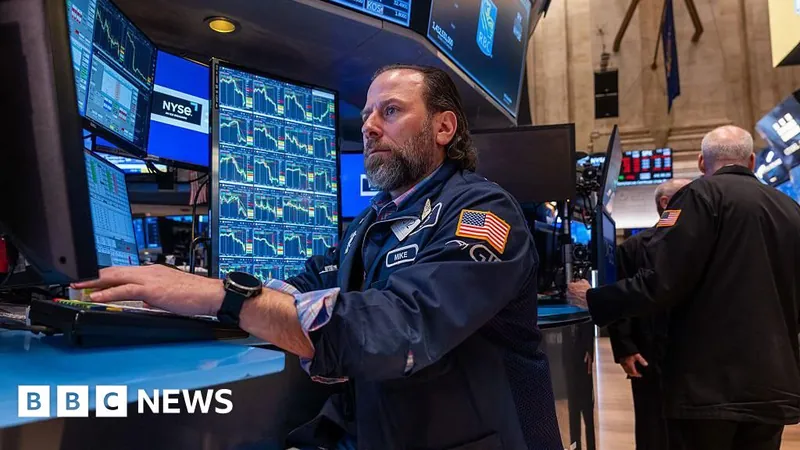
Trade War Turmoil: US Stocks Face Devastating Decline as China Strikes Back
2025-04-04
Author: Jia
The stock market was rocked Friday, marking the worst downturn for US equities since the early days of the COVID-19 pandemic, as China retaliated against President Donald Trump’s recently imposed tariffs. This escalation raises serious concerns about a prolonged trade war and potential global economic fallout.
In a staggering wave of losses, all three major US indexes plummeted by more than 5%, with the S&P 500 experiencing nearly a 6% decline. This downturn capped off the most severe week for the US stock market since 2020, resulting in a loss of trillions in global market value.
The ripple effects were felt worldwide, with the UK's FTSE 100 sinking almost 5%—its steepest drop in five years. Asian markets also tumbled, while European exchanges, including Germany's DAX and France's CAC 40, recorded significant declines.
Trump, who has positioned himself as a figure seeking to reshape global trade dynamics, downplayed the market's negative response, asserting the strength of the US labor market. On social media, he confidently stated, “Hang tough. We can't lose,” seeking to rally his supporters amid the chaos.
The sweeping 10% import taxes on a wide range of products—including key goods from China, the European Union, and Vietnam—have analysts dubbing this move as the most significant tax increase in the US since 1968. Economists warn that these tariffs could trigger a contraction in trade, potentially driving many global economies into recession.
In a bold counteraction, China announced a staggering 34% tariff on US products and restricted exports of essential minerals, accusing the US of “bullying” and flouting international trade agreements. Meanwhile, the European Union is reportedly weighing its options for retaliation and has indicated a willingness to engage in negotiations, despite mixed signals from the US administration.
Prominent economists are voicing concerns about the market's downward spiral, which began with tech giants like Apple and Nike being hit first due to their reliance on Asian suppliers. However, the negative sentiment has now extended to sectors typically insulated from tariff impacts, including consumer staples and healthcare.
JP Morgan has adjusted its forecasts, increasing the likelihood of a global economic recession to 60%, up from the previous 40%. Investors are anxious as they grapple with Trump's unexpected and aggressively far-reaching policy changes, sparking concerns about prolonged instability in financial markets.
Jerome Powell, head of the Federal Reserve, expressed caution, highlighting the heightened unpredictability surrounding consumer prices and economic growth. Several small business owners, like Pat Muscaritolo of Jacobson Appliance in New Jersey, fear the impact of rising costs may force them to close shop, with projected price hikes on essential goods looming.
Amidst the chaos, some sectors showed resilience, particularly housing-related stocks, as investors speculated that the turmoil might prompt reductions in mortgage interest rates. Nike's shares saw a slight recovery after a conversation between Trump and the Vietnamese leader suggested potential trade negotiations.
Despite pockets of hope, the broader landscape remains bleak, with stocks like Apple suffering significant losses. The Dow Jones Industrial Average fell 5.5%, edging down 10% from its February peak, while the tech-heavy Nasdaq dropped 5.8%, entering bear market territory.
The ongoing situation has drawn criticism even from Trump’s allies, with voices like Republican Senator Ted Cruz cautioning against the risks of sustained tariffs leading to retaliatory measures from other nations. He warned that if the trade standoff continues, Americans could find themselves burdened by excessive tariffs on both domestic and imported goods.
As the world watches the developments unfold, the stakes are higher than ever, with economic stability hanging in the balance. What will be the ultimate fallout of this trade war, and how will it reshape the future of global commerce? Only time will tell.



 Brasil (PT)
Brasil (PT)
 Canada (EN)
Canada (EN)
 Chile (ES)
Chile (ES)
 Česko (CS)
Česko (CS)
 대한민국 (KO)
대한민국 (KO)
 España (ES)
España (ES)
 France (FR)
France (FR)
 Hong Kong (EN)
Hong Kong (EN)
 Italia (IT)
Italia (IT)
 日本 (JA)
日本 (JA)
 Magyarország (HU)
Magyarország (HU)
 Norge (NO)
Norge (NO)
 Polska (PL)
Polska (PL)
 Schweiz (DE)
Schweiz (DE)
 Singapore (EN)
Singapore (EN)
 Sverige (SV)
Sverige (SV)
 Suomi (FI)
Suomi (FI)
 Türkiye (TR)
Türkiye (TR)
 الإمارات العربية المتحدة (AR)
الإمارات العربية المتحدة (AR)